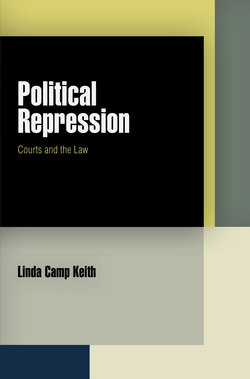Political Repression

Реклама. ООО «ЛитРес», ИНН: 7719571260.
Оглавление
Linda Camp Keith. Political Repression
Отрывок из книги
Political Repression
Bert B. Lockwood, Jr., Series Editor
.....
Political scientists have created a significant body of research examining both domestic and international influences on political repression. In the past couple of decades we have seen the creation and dissemination of large cross-national data sets that encompass all countries and increasingly longer periods. Over time, both our measurements and statistical methodologies have improved substantially. The majority of large-N cross-national studies of state repression have typically focused on explanatory factors that are primarily domestic. These factors largely reflect rational actor assumptions, and they capture both agent (regime) and environment dimensions (domestic threat and opposition and socioeconomic conditions). As Davenport and Armstrong (2004) note, over time a “standard” model has emerged in the repression literature (Poe and Tate 1994; Poe, Tate, and Keith 1999 and citations therein). The standard model has typically included measures of domestic threats or opposition, regime type (democracy, autocracy, military, and leftist), and socioeconomic conditions (economic development, population, and colonial legacy). These influences represent the most consistently studied expectations in the cross-national literature. Some of these factors have proven to be more significant than others in empirical analyses. I discuss these findings in the section that follows. Each of the eight conditions in this standard model represents the domestic context or environment of the state, with one exception (international war, which is a part of the broader state concern with threats to the regime). This context either creates or constrains the regime’s opportunities to repress or affects the regime’s decision-making calculation of the advantage or disadvantage to exercising repressive tools as a means to achieve its policy goals. The body of empirical work has gradually expanded beyond domestic influences to examine a variety of international or transnational influences, including bilateral aid, multilateral lending programs, international treaty regimes, trade relations, and foreign investment. In this section I seek to identify the most important factors that have been shown to constrain or facilitate a state’s choice to employ the tool of repression, while at the same time identifying some of the weaknesses that still limit our understanding of such behavior. I discuss domestic influences first, then the international or transnational influences, noting, of course, that increasingly these contexts are difficult to separate from each other.
Domestic Influences
.....